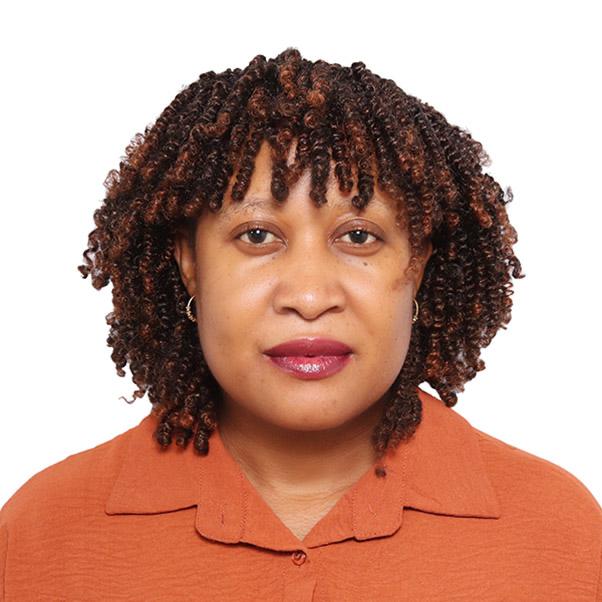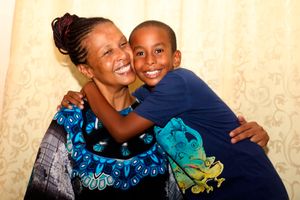My IVF journey: Four failed attempts and twin boys at long last

Josphine* (left) explains her struggles in trying to conceive to Mwananchi Communications Limited Online Editor Zourha Malisa.
What you need to know:
- The high cost of IVF is attributed to the drugs used to prepare the mother, equipment, and medications required for egg harvesting and embryo transfer.
- Out of 10 women who undergo IVF for the first time, two to three will achieve pregnancy.
Thirteen years of trying did not discourage Josephine (not her real name) from her unwavering determination to conceive, even after spending more than Sh1.2 million (TZs20 million) in search of a baby.
Josephine, now 49 years old, is a mother of twin boys aged five years old. She considers them a source of comfort after enduring years of suffering.
"Having a child at my age is a gift from God," says Josephine, a resident of Arusha, Tanzania.
Josephine and her husband spent more than 10 years searching for a child, undergoing four IVF cycles and spending more than Sh3.8 million (TZs60 million), with Sh2.5 million (TZs40 million) being provided as assistance from hospital.
She shares that some people, including her husband's relatives, doubted her ability to conceive due to her age. "When facing difficulties in getting pregnant, society often blames the woman, using hurtful words and labels. Without faith, it's easy to waver and lose hope. Initially, those words hurt me deeply," she recalls.
At first, Josephine sought advice from many people and tried various remedies. She also attended prayers in different churches, seeking divine intervention.
She explains that during the first four years of marriage, the couple did not seek medical help or take any medication.
She shares that a glimmer of hope appeared when she met one of her brothers who informed her about IVF treatment.
"I decided to visit a centre that offers the treatment and the doctor advised that it was the best option on the table as natural conception was not working. However, it took eight months for me to agree to it. During this time, we also fervently prayed for success, considering the high cost associated with IVF.
"The first IVF journey was challenging as it cost almost Sh800, 000 (TZs12 million), not including the expenses for medication and tests. I had to secure a Sh1.2 million (TZs20,000) loan to afford the treatment," says Josephine, who works as a teacher.
“I visited the hospital every day for two weeks and by the time I was done, I had more than 38 injections on my stomach," she explains. During the treatment process, Josephine received follicle-stimulating hormone (FSH) to stimulate egg production.
The first attempt
After completing the injections, the doctors proceeded with egg harvesting and embryo transplantation.
"For those 14 days, I was instructed to get enough rest. I continued receiving injections throughout that period," she shares.
She goes on to explain that when she later went to the hospital for a pregnancy test, it was negative.
"I was so disappointed and the doctor assured me that he would relay the news to my husband. The weight of it made me contemplate a lot. We still had the loan to repay. At times it felt like we were losing hope, but we prayed for strength," she explains.
Despite the setback, she shared that her husband remained supportive. "He was the one who uplifted me. He assured me that even if we didn't conceive, he wouldn't abandon me.”
She adds: "The doctor suggested that we try the transplantation again. However, I hesitated for about four months. The financial burden of the treatment and the ongoing recovery to repay the loan made me uncertain about undergoing the procedure again."
After receiving the doctor's advice, they were informed that the hospital would cover the cost of the second phase of treatment, which amounted to Sh956,000 (TZs15 million), while they would be responsible for the expenses related to tests, medication and injections.
"We agreed to proceed with the second round of treatment, but even with the hospital covering the costs, there were times when we struggled to afford the injections. Our salaries were our only source of income and we ended up spending most of it for the treatment and repayment.”
Despite their efforts, she did not achieve pregnancy as expected.
"This made me question what the problem could be. These thoughts kept swirling in my mind and despite receiving advice from the doctor and his team, I started doubting my ability to conceive," she says.
The third attempt
Even during the third round of embryo implantation, she did not achieve pregnancy. "The results were disappointing. For this third attempt, the hospital covered the cost of Sh956,000 (TZs15 million) and we were responsible for the medication and tests. "My body needed rest, especially from the numerous injections. In the first phase, I received over 38 injections in my stomach, one injection every day for 14 days. The second and third phases involved the same number of injections and medications. My mind and body were exhausted, and I needed to take a break," she explains.
Fourth attempt
She says that in 2018, she decided to resume treatment. This time they opted for Intrauterine Insemination (IUI) instead of in vitro fertilisation (IVF). Intrauterine insemination is a fertility treatment procedure in which sperm is placed directly into a woman’s uterus to facilitate fertilisation. After a 14-day wait, she underwent a pregnancy test and received the joyful news that she was pregnant.
"I was overjoyed; my dreams had finally come true. But that was short-lived. My life completely changed within just one month of being pregnant.”
She recalls the day it happened. She was attending a friend’s wedding and as she was lining up to serve lunch, she noticed that she was bleeding. "I was shocked. I rushed to the hospital and received the devastating news that I had lost the pregnancy. It was a painful blow and my happiness was abruptly shattered.
"However, the doctor had a different reaction. Instead of expressing sadness, he laughed and explained that my situation was clear; I could conceive. He suggested that my husband and I should undergo the treatment again — a fourth IVF transplant — just one month after the previous pregnancy," she recounts. They proceeded with the fourth IVF, which involved a new treatment involving hormone injections for 10 days to stimulate egg production, followed by implantation and continued hormone injections for 14 days.
After a fortnight's wait, Josephine took a pregnancy test and received the joyous news that she was pregnant. For the next three months, she continued to receive hormone injections, with each injection costing at least Sh650 (TZs10,000).
After three months, she transitioned to another drug used in the treatment of infertility, which cost Sh5,700 for a 20-day dose. This treatment continued for three months. Nine months later, Josephine gave birth to twin boys through cesarean section. Today, they are five years old.
Dr Nicholas Muzunguni explains that some women undergo multiple IVF treatments without success, while others achieve pregnancy after just one attempt. The outcome depends on factors such as the woman's body, response to medication, and the specific issue being addressed.
According to statistics from the World Health Organization (WHO), the success rate of IVF in achieving pregnancy or having a child ranges from 15 to 45 per cent. The chances vary based on the woman's age and the underlying problem.
He notes that the cost of IVF typically starts from Sh450,000 TZs7 million). The high cost is attributed to the drugs used to prepare the mother, equipment, and medications required for egg harvesting and embryo transfer. "Out of 10 women who undergo IVF for the first time, two to three will achieve pregnancy. These women face different challenges that prevent natural conception. I encourage women to persevere and follow the recommended conditions without giving up.
Dr Mazunguni highlights that women between the ages of 18 and 35 have a higher likelihood of successful egg production when using fertility drugs compared to those aged 36 and above.
"When repeating the treatment, everything starts anew, from the hormone injections to stimulate egg production. The cost varies depending on the specific problem each woman faces. We advise patients to be prepared for any outcome during the transplant service and not to lose hope," he advises.





